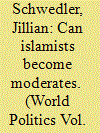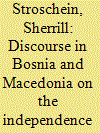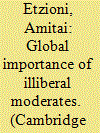| Srl | Item |
| 1 |
ID:
103867


|
|
|
|
|
| Publication |
2011.
|
| Summary/Abstract |
Recent years have seen a surge of studies that examine the inclusion-moderation hypothesis with reference to political Islam: the idea that political groups and individuals may become more moderate as a result of their inclusion in pluralist political processes. Most of these interventions adopt one of three foci: (1) the behavioral moderation of groups; (2) the ideological moderation of groups; and (3) the ideological moderation of individuals. After a discussion of various definitions of moderate and radical, the concept of moderation, and the centrality of moderation to studies of democratization, the author examines the scholarship on political Islam that falls within each approach. She then examines several studies that raise questions about sequencing: how mechanisms linking inclusion and moderation are posited and how other approaches might better explain Islamist moderation. Finally, she offers a critical analysis of the behavior-ideology binary that animates many of these models and suggests some fruitful paths for future research.
|
|
|
|
|
|
|
|
|
|
|
|
|
|
|
|
| 2 |
ID:
122778


|
|
|
|
|
| Publication |
2013.
|
| Summary/Abstract |
Bosnia and Macedonia declared independence from Yugoslavia in 1991 and 1992, and subsequent referenda legitimised these declarations, but unitary state actors did not emerge. Rather, Bosnia and Macedonia each contain groups with divisive views regarding the nature of the state in which they live. Kosovo is regularly invoked as an example in their contentious discussions. In this essay, I present a framework for understanding this discursive contention in which Kosovo provides the focus for disputes between extremists and moderates of different groups. Within the two states, groups differ over the recognition of Kosovo's declaration of independence and the question of whether this might constitute a precedent. A political, rather than simply a legal, view on these discussions helps us to better understand not only these dynamics, but similar contestations unfolding elsewhere.
|
|
|
|
|
|
|
|
|
|
|
|
|
|
|
|
| 3 |
ID:
074075


|
|
|
|
|
| Publication |
2006.
|
| Summary/Abstract |
In contrast to the claim that the most significant fault line in contemporary global affairs is between the civilisation of the West and all others, this essay argues that the schism between those who advance their values through violence and those who rely on persuasion, both of which are present in all civilisations, is the greatest source of conflict in the post-Cold-War era. Moderates come in many stripes: some are liberal, such as Reform Jews and Social Democrats, while most others are illiberal, including many Muslim religious leaders. All moderates, however, share in common a principled rejection of violence. Polls and reports from around the world bear out that a conviction of the value of persuasion over coercion does not depend on faith in democracy or secularism. The West should ally itself with such moderates, no matter how liberal or illiberal their orientation.
|
|
|
|
|
|
|
|
|
|
|
|
|
|
|
|